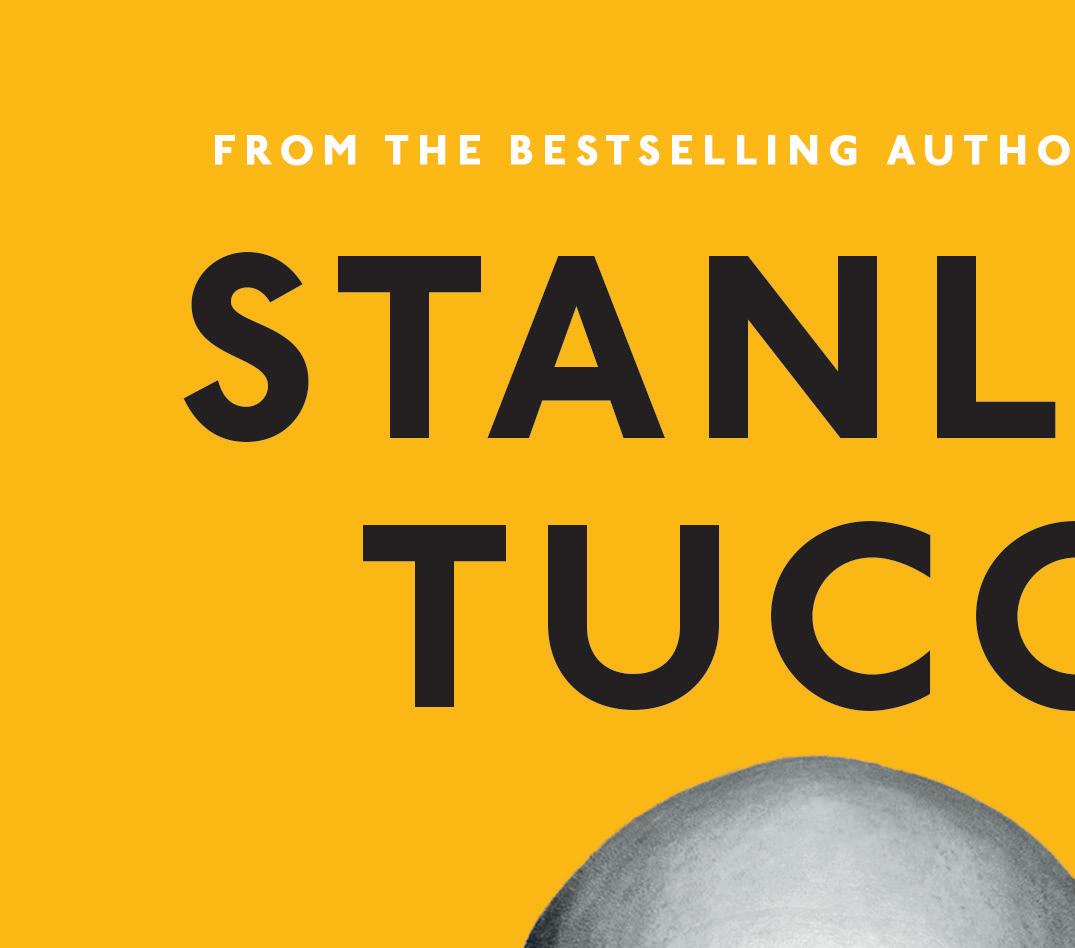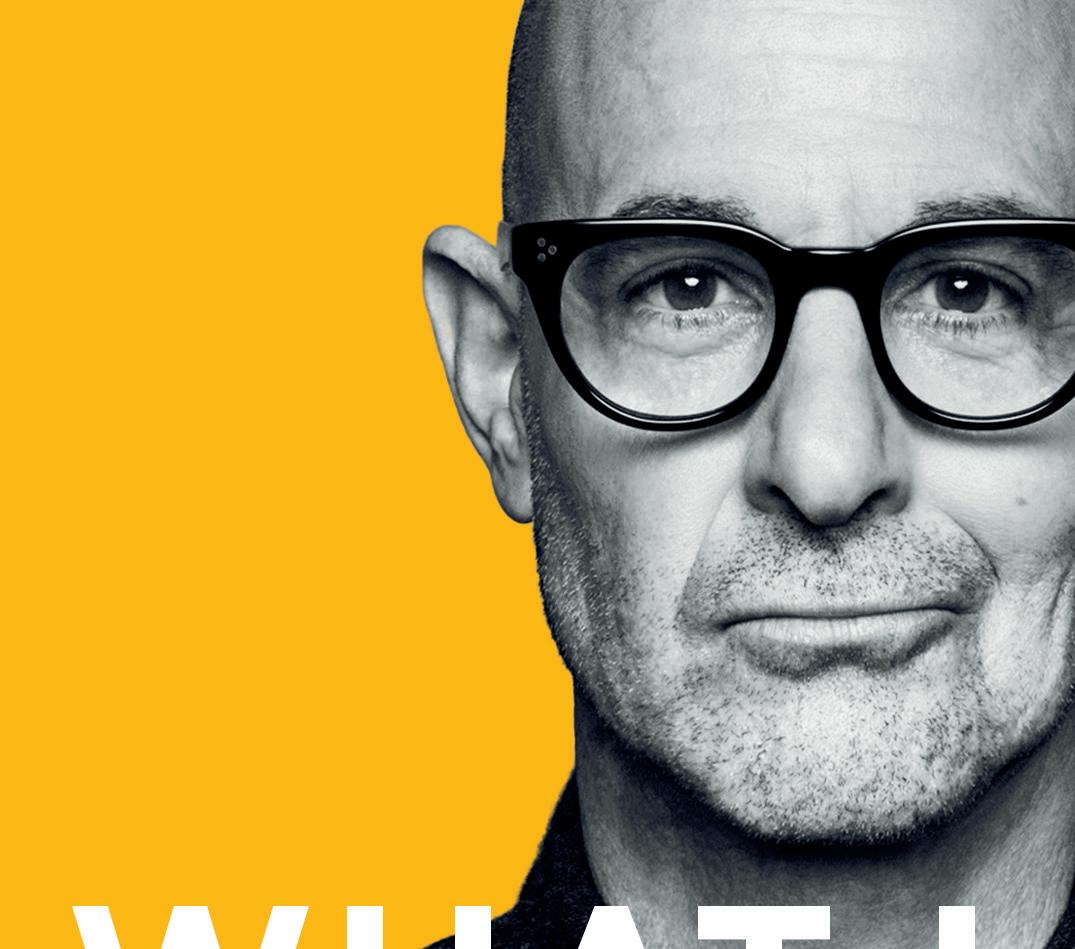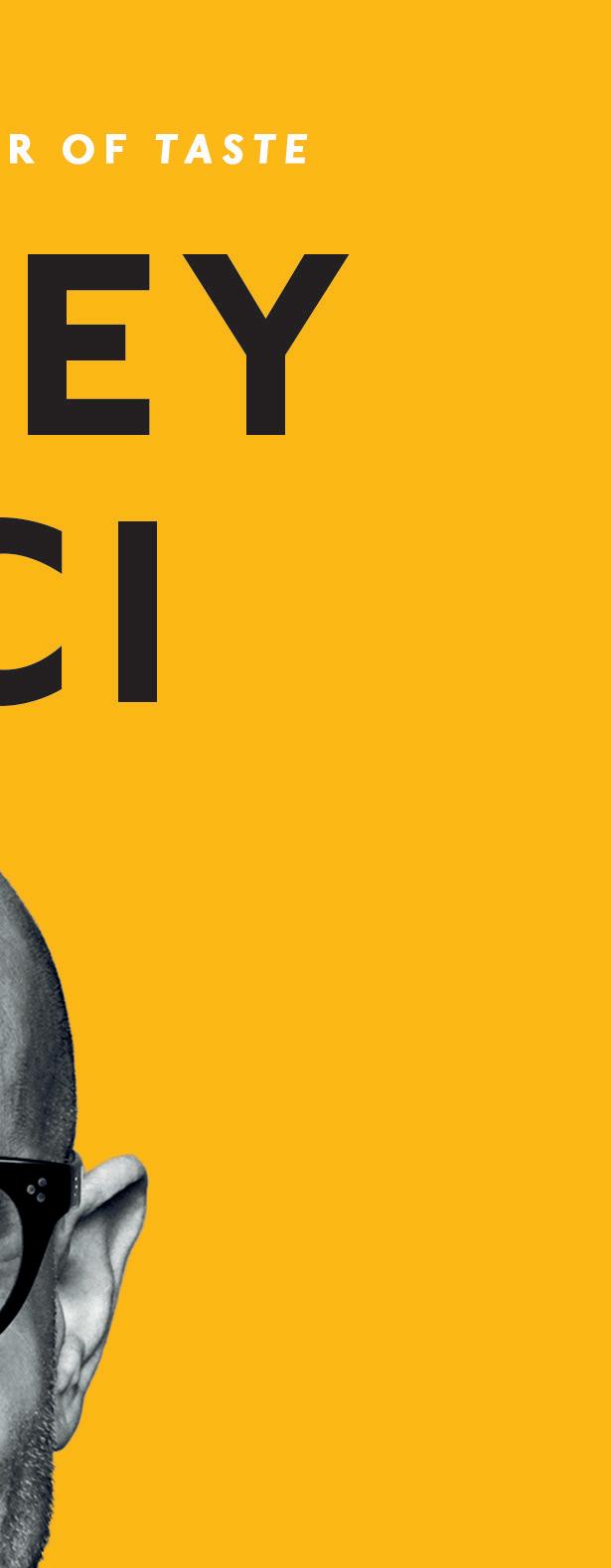PENGUIN BOOKS
UK | USA | Canada | Ireland | Australia India | New Zealand | South Africa
Penguin Books is part of the Penguin Random House group of companies whose addresses can be found at global.penguinrandomhouse.com.
Penguin Random House UK , One Embassy Gardens, 8 Viaduct Gardens, London SW 11 7BW penguin.co.uk
First published in the United States of America by Gallery Books, an imprint of Simon & Schuster, LLC 2024 First published in Great Britain by Fig Tree 2024 Published in Penguin Books 2025
Copyright © Stanley Tucci, 2024
The moral right of the author has been asserted Penguin Random House values and supports copyright. Copyright fuels creativity, encourages diverse voices, promotes freedom of expression and supports a vibrant culture. Thank you for purchasing an authorized edition of this book and for respecting intellectual property laws by not reproducing, scanning or distributing any part of it by any means without permission. You are supporting authors and enabling Penguin Random House to continue to publish books for everyone. No part of this book may be used or reproduced in any manner for the purpose of training artificial intelligence technologies or systems. In accordance with Article 4(3) of the DSM Directive 2019/790, Penguin Random House expressly reserves this work from the text and data mining exception
Typeset by Jouve (UK ), Milton Keynes Printed and bound in Great Britain by Clays Ltd, Elcograf S.p.A.
The authorized representative in the EEA is Penguin Random House Ireland, Morrison Chambers, 32 Nassau Street, Dublin D02 YH 68
A CIP catalogue record for this book is available from the British Library
ISBN : 978–1–405–96372–5
Penguin Random House is committed to a sustainable future for our business, our readers and our planet. This book is made from Forest Stewardship Council® certified paper.
To my wife, Felicity.
To my family.
To my friends.
To those I loved who are no longer at my table.
A Preamble
I never dream about food. At least there are no dreams I’ve had about food that I can remember. I dream about so many things, and like most people’s, my dreams are wildly complex, nonsensical, and filled with twisted takes on past experiences or fears I’ve had or still have, like the inability to contact my wife, Felicity, or physically protect myself or a loved one.
Often, I dream that I am about to graduate from high school but have avoided going to maths class all year and keep hoping that I will get away with it and still be allowed to graduate. The dream is so real that I awaken in a state of terrible anxiety, believing that I will be found out, won’t be able to graduate, and will need to repeat my senior year, until I suddenly realize that it was just a dream and in fact I am no longer in high school but in my sixties, and even though I am still dreadful at maths, I did indeed graduate and have gone on to lead a very full life.
I also consistently have the classic ‘actor’s nightmare’. This subconscious manifestation of a deep-rooted fear entails being onstage, naked, half undressed, or in the wrong costume, filling in last minute for another actor, completely under-rehearsed, and not knowing one’s lines. (Ask any actor and they will tell you they have had basically the same dream.) The irony is that I actually experienced it twenty years ago, when I was doing a play that required me to be naked for the first ten minutes or so and at least once during those ten minutes I completely forgot my lines. Unfortunately some dreams do come true.
And then, of course, there’s death. I dream a lot about death. The dead. Relatives, friends, and frequently my late wife, Kate. It has been said that if we have ‘unfinished business’ with someone or something in our lives, that event or person will visit us again and again in our dreams. I suppose it makes perfect sense. It’s a way for our minds and hearts to deal with issues we’ve never fully dealt with.
But as I said, even though food plays a huge part in my waking life, it never plays any part in my dreams. Maybe because I don’t fear it. It just makes me happy. It doesn’t provoke anxiety, and in fact it may be the only significant aspect of my life that brings me peace. All others –work, children, marriage, friendships, family – bring me real joy, but I can’t pretend they are not anxiety inducing. However, food is just there. A beautiful, varied thing waiting to bring satiety and solace and offer hope while death and arithmetic haunt me.
Speaking of numbers, food, and death, I’ve always imagined that there are three possible experiences waiting for us when we die.
The first is that we die, and then we simply are no more. There is nothing. And that is that.
The second is that we die and find that death is a long meal alone with terrible food.
The third is that we die and find that death is a table resplendently set with an extraordinary meal for us and all those we’ve ever loved to share for the rest of eternity.
If possible, when my time comes, I’ll let you know which one awaits.
Tell me what you eat, and I will tell you who you are.
JEAN ANTHELME BRILLAT-SAVARIN
What I Ate in One Year
(and related thoughts)
January 2, 2023
Iwas sad to leave home, as it had been such a lovely holiday with Felicity and the kids, friends, and extended family. I’m headed to Rome to film Conclave, a movie with Ralph Fiennes, John Lithgow, and Isabella Rossellini, directed by Edward Berger. The film is based on the book of the same title by one of my favourite novelists, Robert Harris, about the choosing of a new pope. I read it a few years ago and was thrilled when I was sent the screenplay and asked to be a part of it. Excited to work with all of them. Have worked with Ralph and Isabella, and I know John a bit. Edward just did All Quiet on the Western Front, which was extraordinary. I had met him twice prior to filming and what a lovely fellow he is.
Relatively easy flight to Rome. Arrived at hotel/short-term-stay apartment, which I had only seen online. Some of the other cast is staying here as well. It’s a ‘high-concept’ place that is conveniently located, about a twenty-five-minute drive to Cinecittà, where we will be doing most of our filming.
My apartment is spartan at best. It is not designed with comfort in mind. It’s designed with the architect’s ego in mind, with which he is clearly incredibly comfortable. It consists of a living/kitchen area with a very small uncomfortable couch, a marble dining table, and a stainlesssteel kitchenette against one wall. It has one rather small bedroom with
a bed that looks like a bed should look but feels like a bed shouldn’t feel.
At least I have the small kitchen. I actually have two kitchens because I requested a connecting room for when family and friends visit, and it has a small kitchen as well. Things are looking up. Ish.
Production kindly stocked the place with staples that I requested. Pasta, both fresh and canned tomatoes, olive oil, bread, salt, butter, carrots, celery, canned beans, canned tuna, orange juice, Nespresso pods, bottled water, Tupperware, a set of chopping boards, and new knives. I asked for the Tupperware so I can transport my own food to set, as on-set catering, even in Italy, is usually questionable. More to follow on that subject.
I try not to think about spending the next eight weeks in this place. I am already missing my family and my house. Especially the kitchen. And my bed because my bed at home feels like an actual bed as opposed to those marble slabs used for making fudge.
I poured myself a glass of wine and then it suddenly occurred to me that I was hungry. The lovely people at the front desk recommended a place to eat around the corner.
I went there.
I ate.
I would not recommend it.
January 3
Today I unpacked properly because, as I said, I will be here for the better part of eight weeks. However, I will be flying back and forth to London whenever I have a few days free. I try to never be away from home for more than two weeks at time. The travel is tiring but it’s better for my sanity and the family as a whole in the long run.
I begin rehearsals and final costume fittings on Monday, but today I just settled in, used the gym, worked on my script, and made a light lunch. Cannellini beans, canned tuna, red onion, tomatoes, and olive oil. I made a pot of tomato sauce because I find the act and aroma comforting and I know I will eat it with pasta or rice over the next few days. I tried to get the television to work. I couldn’t. I’m not very good with technology, and if this TV is as complex as the wall-mounted touchscreen panel for the lighting, which seems to have been designed by an angry astronaut, then I am going to need assistance. A lovely woman designated to help the cast with travel, errands, and technical issues such as this came up to show me how to work the television. She told me that there are no international television channels, only a few Italian ones, which I thought was weird, but lots of streamers, like Netflix, etc. Over the coming weeks I know I will indulge in my guilty pleasure, watching a spate of World War II documentaries. I can’t get enough of them. I think I have seen The World at War a dozen times.
The weather in Rome this time of year rivals London. Actually, it’s worse. Very cold and very wet.
Tonight I had dinner with my friend Claudia and her husband, Andrea. I met Claudia many years ago here in Rome and we have remained friends. I wrote about her in Taste, and she is featured in the Rome episode of Searching for Italy. We went to Taverna Trilussa in Trastevere, an ancient and now very hip part of Rome, which is much more gentrified than when Claudia first took me there thirty years ago. We sat outside under the permanent awnings and had a classic Roman meal, which means lots of pasta. We had both white and red wine and some appetizers: salami, prosciutto, and zucchini flowers stuffed with mozzarella.
I ordered the bucatini all’Amatriciana, Claudia the strozzapreti Antonietta, a thick pasta with Parmigiano, pesto, and small tomatoes. I can’t remember what Andrea ordered.
There are many versions of strozzapreti, which means ‘priest chokers’. Supposedly this pasta got its moniker because during the Middle Ages, Catholic priests felt it was appropriate to freely help themselves to the eggs harvested by their poor parishioners. This selfish act caused the parishioners, who were already lacking in just about everything, to make their pasta without eggs, resulting in a very thick pasta they would serve to the priests in the hope that they would choke to death.
Another version of this story is that the priests were just innately gluttonous and ate so much so fast that they choked to death. Which version is the truest, I don’t know, but I like the fact that food, religion, and death are cojoined in the history of a single recipe.
January
4
That week I cooked at the hotel/apartment a couple of times. I stuck to my usual simple meals that consist of pasta with some sort of sauce and some greens.
I also ate in the extremely ascetic hotel restaurant. Though the place was never busy, the food always took ages to arrive, and when it did, what was put before me were small portions of some dish that was overthought, overwrought, and fussed over to the point of unrecognizability. During the course of my stay, I ended up eating there only a few times merely out of convenience and left hungry every time.
It was evident that the chef was vying for some kind of recognition from the entities that give recognition to chefs. I find this unfortunate. In film and theatre, one can feel an actor trying too hard (what my teacher George Morrison used to describe as ‘pushing’ a performance), as if to say, Look at what depth of feeling I have! They are showing us how well they are acting, instead of just simply being. They believe that this behaviour will garner them awards, and unfortunately sometimes it does. But no person should ever do what they do to win awards, because their work will reek of desperation and therefore never ring true. Or, in the case of a chef, taste good.
After five days of rehearsals and fittings I flew home, as I was not to begin filming for another week.
January 16
I returned to my austere Roman accommodations on a Saturday night, during which I slept fitfully. I spent the next day exercising and memorizing lines. Unless I have someone to read the lines with me, I do this with the aid of a tape recorder. I record the other actor’s lines and leave gaps for my own. And then I do it over and over and over again. Tedious but necessary. Especially as one ages. If a script is well written the lines will come easily. If not, then they don’t. Actors will often blame themselves for not being able to retain certain passages or scenes, but it is often the script that is to blame because the character’s thoughts don’t track. By this I mean that the character isn’t speaking naturally but instead the writer is using that character as a mouthpiece. In this case I always suggest a collaborative rewrite, which, depending on the egos involved, sometimes doesn’t go over that well. That night I had another wonderful dinner with Claudia and her husband, who seem to know every great eatery in the Eternal City. We ate at a place called Checchino dal 1887 in the neighbourhood of Testaccio. It turned out to be one of most interesting restaurants I’ve visited in all of Rome. Testaccio is an area so named due to the presence of a fifteen-millioncubic-foot hill of broken amphorae built by the Romans over a period of five hundred years. (‘Testae’ means ‘earthenware shards’ in Latin.) These amphorae held olive oil that had been transported to Rome from all over the empire. Because it was too expensive to ship them back empty to be filled again or because the residual oil was impossible to
clean off, the terracotta vessels were broken into three sections – belly, neck, and arms – and piled carefully to create a hill. Years later it was discovered that within this man-made terracotta hill, when caves were dug as part of new builds, wine could be kept at a perfect temperature due to an ideal circulation system that was created by the way in which the shards were stacked. It is in one of these small caves that Checchino stores an amazing collection of wine from around the world.
The service, led by a fifth-generation family member, was effortlessly carried out, and the food was superb. I had soft, silky carciofi alla romana and a rich lasagna Bolognese in which years of culinary expertise were evident, an attribute that is becoming harder and harder to find in so many places these days.
January 17
I am back at Cinecittà, which translates as ‘Cinema City’. It is a huge complex of offices and studios that was originally built by Mussolini in the thirties and has been expanded upon over the decades. At one time it housed the largest stage in Europe, stage number 5, which was Federico Fellini’s preferred stage.
I fi rst worked here about twenty-fi ve years ago on a fi lm version of A Midsummer Night’s Dream in which I attempted to play Puck. I found it exciting to be working on this historic lot, but I remember being saddened by the state of the place. Th e grounds were unkempt, the buildings not only in need of paint but practically crumbling and their interiors unclean. I was told that the whole complex had been upgraded since then, as many more international productions were fi lmed there as of late, bringing in more money. I was told wrong.
Basically, it looks exactly the same. It’s still in need of repairs, a fresh coat of paint, and a good scrub. A little heating might help, as it was colder inside the studio than it was outside its decaying walls.
To make matters worse, the catering is dreadful. Really. Dreadful. Gross, even. Heavy-handed sauces, overcooked pastas, stringy meats. I won’t go on. I’ve already written about the sad state of Italian film catering in my first book, but I had hoped it might have progressed somewhat since my experience with it twenty-five years ago. All I can say is . . . alas, it has not.
Therefore, I bring my lunch every day or just make do with a banana and a small panino until the day ends and I can head to a restaurant, either alone or with one of my castmates, all of whom thankfully love food and wine. I prepare my on-set meals as follows.
Sunday, I make a large pot of minestrone and reheat it in the dressing room microwave over the course of two or three days. The second half of the week I make pasta or a risotto with marinara or sautéed vegetables and do the same. Something light but filling. I don’t like to eat a lot when I am filming as it saps my energy. I save my appetite for a proper meal in the evening. Lots of water with lemon, rooibos tea, rice crackers with peanut butter and honey, and a mid-afternoon espresso have got me through many shooting days. As I’m playing a cardinal, I’m dressed in layers of heavy garments that require the help of a dresser to take on and off. This makes trips to the loo inconvenient, so the less one ingests throughout the day, the better.
January
29
I have been back and forth to Rome a few times now and besides the lousy catering, working on Conclave is a great experience. Edward is a brilliant director. He is patient and thoughtful. He takes the time to properly rehearse, allowing the movement of the actors to dictate the shots, and yet has a very clear vision for how he wants the film to look and can effortlessly ease an actor into doing something in order to achieve a certain shot that he has designed in advance. I’m honoured to be a part of it, which is not something I say lightly.
The shooting hours are not too long, but on the days that require group scenes with many extras, they are a bit longer because it takes time to get the coverage necessary. (Basically, this means that the more people you have in any given scene, the more shots you need from various angles.) Therefore, there is a lot of waiting around.
But as a famous actor once said when an assistant director apologized for making him wait in his trailer for a long period of time (I was told it was the great Richard Harris but I can’t be sure), ‘Please don’t apologize. It’s the waiting I get paid for. The acting I do for free.’
I very much agree.
January 31
Isabella, John, and I went to a restaurant called L’Eau Vive that Isabella’s mother, Ingrid Bergman, used to frequent. It is run by French Carmelite nuns and has been since it opened in 1969. Housed in an old palazzo, it has a small dining room on the first floor and a large one on the second (the piano nobile), where patrons sit under high vaulted, frescoed ceilings. The tables are covered with white tablecloths with much space between them. The food is classic French: onion soup, baked goat’s cheese with almonds, canard à l’orange, and so on. Each evening one or two Italian options might be offered, as well as one dish from another country – a culinary nod to the international makeup of the sisters themselves. The wine list, mostly French, is simple and, like the food, very affordable. That night the dining room was full of Romans, tourists, and a long table of priests, all eating and drinking to their hearts’ content.
As we tucked in, Isabella told us that her mom frequented the restaurant because it was so off the beaten track, no paparazzi would even think to go there, and if they did, they would probably be too ashamed to try to insinuate themselves into the sisters’ sacred space. In a Catholic country I suppose it’s only logical that nuns would make the best bouncers.
In the middle of our entrée course, the sisters passed around a piece of paper printed with lyrics to a few hymns, all of which were in French. They then gathered at one end of the dining room and began to sing,
and we were encouraged to join in. It was unexpected, it was moving, and it was beautiful.
Being part of a group of strangers from all over the globe, brought together by food, our voices raised in song beneath the fading splendour of sixteenth-century frescoes on a cold Roman night, had a profound emotional effect on all three of us. Although I was raised a Catholic, I never fully acquired the assurance of belief and therefore never really believed. Though I don’t miss going to church every Sunday, I do miss the certainty of ceremony and the security of reverence. But now, in the early winter of my years, it’s through nature, art, and my children that I experience reverence, and in moments around the table that I experience ceremony. All guilt-free.
I didn’t want the singing to end, but like all good things, it did because it had to. There is solace in the knowledge that I can go back when I am next in Rome.
February 3
I’ve chosen to stay in Rome as Felicity is away, the kids are staying with my in-laws, and I’m tired after a long week of filming. My British agent and friend Oriana organized to visit me this weekend, which I’ve been looking forward to. She arrived tonight just as I was finishing work and we went to eat at Checco Er Carettiere, a favourite restaurant of mine that I had not been to for many years.
It has been run by the same family since Francesco (Checco) Porcelli, a carettiere (wine carrier), opened it in 1935. It is now run by his grandchildren and is still frequented by the glitterati, literati, turisti, and regular romani.
On certain nights there is a guitar player serenading the clientele with Italian folk songs and a smattering of foreign ditties as well. Nearly every time I’ve visited, this musician has been a middle-aged woman in a black dress, a white silk scarf draped around her neck, elegantly winding her way through the dining room, stopping at different tables to sing golden oldies in the language spoken by those seated there. If the table was French, she might sing something made famous by Piaf. If the table was Italian, a rendition of ‘O sole mio’ or ‘Arrivederci Roma’. But if the table was American, without a doubt she would sing ‘Country Roads’ by John Denver. Why that particular song, I wish I knew. All I know is hearing those quintessentially American lyrics sung with great fervour in a thick Roman accent remains today one of the most bizarre things I’ve ever experienced,
and will never forget. (If my publishers allow, I will sing it for the audiobook version.)
Unfortunately, tonight, there was no silk-scarved troubadour, but there was, as usual, excellent service and classically delicious Roman fare. Go there.
February 4
This morning Ori and I went to a farmers’ market called Mercato di Campagna Amica al Circo Massimo, right around the corner from the hotel. It’s a mouthful of a name that basically means ‘Country Friendly Market of the Circus Maximus’. ‘Country Friendly’ because everything that is sold comes from within a one-hundred-kilometre radius, and ‘Circus Maximus’ because it’s right across the street from the Circus Maximus. One of the largest markets in Rome, selling cheeses, meats (both cured and raw), vegetables, bread, seafood, fruit, spices, wine, and more, it’s housed in a high-ceilinged room that opens to a courtyard, where fried fish and sandwiches are sold from catering trucks near a kiosk offering beer and wine by the plastic cup.
We bought a focaccia, a slice of pizza with guanciale ( guanciale is cured pig cheek, and what one is supposed to use in carbonara instead of pancetta), sheep’s-milk ricotta, and honey, and sat in the courtyard sunshine that kindly peeked through the clouds for a short while. We ate the pizza, slathered the ricotta on the focaccia, and drizzled it with honey as Ori sipped a white wine and I a beer.
We cleaned ourselves up after that messy repast and wandered a bit aimlessly through the city where shards of ancient Rome punctuate the streets as magnificent but blunt reminders of civilization’s fragility.
After a while we found ourselves by that astounding feat of artistry and engineering known as the Pantheon. No matter how many times I visit it, I am left breathless. Why? I remember reading a book in which
that question was answered so well by the author. She wrote that when she brought her young son to visit the Pantheon, he started to cry. When she asked him why, he said, ‘Because it’s so perfect.’
There is a restaurant about thirty yards away from that hallowed dome, run by two brothers, called Armando al Pantheon, where I filmed a segment for the first season of Searching for Italy. Even though we had just eaten not long before, Oriana and I were hungry again, so we went there. That happens a lot when one is in Italy.
I love this restaurant because both its aesthetic and its menu sit between the elegant and the everyday, which is something we should all strive for. Without hesitating I ordered one of my favourite soups, stracciatella. Stracciatella is in essence an Italian egg-drop soup made with chicken broth, escarole, and, obviously, eggs.
I am a soup lover. To me soup may be the greatest culinary invention. It can be made with two ingredients or two hundred and twenty-two ingredients. It can be served hot or cold. It can be cooked fast or slow. It can be eaten for breakfast, lunch, or dinner. It can be vegetarian, vegan, paleo, pescatarian, or carnivorian. It can be simple or complex. It comforts, it soothes, it refreshes, and it restores. Soup is life in a pot.
One of my favourite children’s stories, ‘Stone Soup’, is about soup. There are many versions, but this approximates the one I remember:
A hungry soldier comes upon a town that is filled with unwelcoming, miserly residents. He knocks at a door and asks the old woman who lives there for something to eat. She says she is poor and has nothing to give him and that everyone in town will tell him the same thing and he should just move on.
Despondent but not deterred, the soldier finds a kettle, builds a fire in the town square, fills the kettle with water, sets it over the fire, and places a large stone inside it. The old woman looks out
of her window and asks what he is doing, and he tells her that he is making stone soup. Curious, she comes to see for herself and is soon followed by the other villagers. They all tell him that it’s impossible to make soup from a stone, but the soldier tells them that he has done it many times and that in fact stone soup is delicious. (In some versions he tells them that the stone is a magic stone.) All the villagers stand around the pot waiting to see if he is telling the truth. After a while the soldier tastes it and says it’s nearly there but it could use a couple of onions to improve it. The old woman gets a couple of onions and tosses them into the pot. The soldier tastes it again and says it could use some garlic, and a villager runs to get garlic. This continues with carrots, parsnips, celery, beans, a chicken, herbs, and so on until the kettle is filled with a hearty soup that the soldier shares with the villagers. Soon they realize that it wasn’t the stone that made the soup so delicious, but the ingredients they all shared to make it. After this, they are no longer miserable and parsimonious, but happy and generous.
I think it’s one of the best stories about how man treats his fellow man (badly in the case of the villagers and kindly in the case of the soldier). But it’s also about how food not only brings people together but makes life better.
Anyway, I ordered the stracciatella and it was everything I wanted it to be. For my main, I ordered the carbonara (I guess I felt I needed more eggs), and it was scrumptious. Oriana ordered the Amatriciana, which was equally as good. When we finished gorging, we shared a look that silently asked each other, Why and how did all that go into our bodies, and do you think they have a place in the back where one could just lie down for an hour or so?
After an espresso, we took a long stroll to minimize the damage done by our lack of restraint at the table. We wandered past the Vittorio Emanuele II monument, an ill-proportioned white marble monstrosity that looms over Piazza Venezia, known by the locals as ‘the wedding cake’ or ‘the typewriter’ because it resembles grotesque versions of both, and made our way to the Spanish Steps, which I happen to think are beautifully proportioned. Eventually, after shuffling off our postprandial sloth, we found ourselves at the rooftop bar of the Hotel Eden with martinis in hand watching the day disappear over Rome.
February 16 –19
Felicity and the kids came to visit and, at the risk of sounding too sentimental, I felt whole again. The evening they arrived, we went to a lovely restaurant that I had been to before called Sora Lella, just walking distance from the hotel. It is run by the grandson of Elena Fabrizi, who opened it in 1959. Born in 1915, she had been an actress of some note throughout her life, and her brother was the famous Italian actor Aldo Fabrizi, but she loved to cook, so she and her husband (who worked in an abattoir) started this restaurant. The menu, like the owners, is very Roman: guanciale-based tomato sauces and various offal, such as sweetbreads, tripe, and pasta con pajata di vitello a latte. The latter is one of my favourite Roman dishes and something I order repeatedly while I am there.
The sauce is made with the intestine of a baby calf that is slaughtered while the mother’s milk is still inside of it. (Apologies to the fainthearted.) The intestine, its contents, and the light tomato sauce they are cooked in give the dish a singular flavour that is at once sweet and slightly sour. I first had it many years ago, but it was on this trip that I really came to appreciate not only the delicacy of it but also its brilliance. Again, the poor Romans made something extraordinary tasting as well as nutritious out of what most others might carelessly discard. Having been to Sora Lella a few times myself, I wanted to take Felicity and the kids there, because the staff were so kind and I knew they would welcome the kids heartily, which they did. We ate a great
deal that night, although Millie was a bit picky and just ate her usual handfuls of prosciutto and bread, followed by pasta with butter and cheese. Matteo was more adventurous and devoured his first arancini along with some pasta alla marinara. I must attempt to make arancini for him because he keeps talking about them. However, I know that his response will be something like, ‘They’re just not quite the same as the ones in Rome.’ Maybe I won’t make the attempt. As an actor I have suffered too much rejection over the years. Why go begging for it?
We took a tour of the Colosseum, which was wonderful but a bit long for four-and-a-half-year-old Millie, even though she had a carton or two of breadsticks to keep her occupied. After she took her first bite and showered the ancient floors with crumbs, the legion of pigeons who frequent that ruin followed Millie (now known as Gretel) and remained her devoted companions for the rest of the tour.
On the last night of their stay, I made some pasta, and we ordered in a pizza at Matteo’s request as we had been out and about all day and everyone was too tired to eat out again. I asked the kids to make some drawings of what they had seen over the last couple of days. Matteo drew gladiators in the Colosseum, and Millie drew a view of the Colosseum surrounded by grass and sky that would make any artist wish they could draw with such assurance and beautiful, poetic naivety. Like my father, an art teacher, did with us when we were children, I have always encouraged my children to draw and paint. Though you all may be working separately, there is a bond that is silently happening between you. Sharing each other’s drawings when you’ve finished is the completion of that bond.
I was so happy to have them all there. Due to my career choice,
the consistency of ‘normal’ family life is impossible. Dinner at a certain time, helping with homework, going to school activities or sports matches, bedtime stories, and so on, what we might consider the mundane. The hardest part of being an actor is finding that family/work balance. This is true in so many professions, but it’s the distance apart for long periods of time and the constant changing of shooting schedules and locations that make it even more difficult. Some actors will bring their family with them on many if not all jobs. The kids will be either put into a local school or home-schooled. I think this is fine every now and again, and in fact, I have done it a number of times over the years and have found it to be a very positive experience for the kids. But fundamentally I believe that children want and need consistency of place and people. It keeps them grounded and secure. I chose this profession, they did not, and therefore it’s up to me to travel back and forth as often as possible. That said, having them there for those few days, my strange soulless apartment was transformed into a home. It was my happiest time in Rome.
February 20–March 8
Working in Rome continued like this for the next few weeks. I mostly cooked at home as I was working every day, but if we didn’t wrap too late and I wasn’t too tired I would find a castmate to dine with or have a quick meal out alone.
Ralph, a true food lover, and I ate together several times, diving headlong into Roman dishes accompanied by bottles of red from the most northern parts of Italy, like Alto Adige or Friuli. We realized we both preferred these regions’ softer, less tannic reds to the stronger reds of middle and southern Italy. Most men prefer heavier, ‘meatier’ wines with lots of tannins. Due to insufficient saliva (a lingering effect of radiation treatments), anything that is too tannic is nearly impossible for me to drink, so I have found my way to soft, silky pinot noirs and the like and am happy with them. I was also happy to get to know Ralph. We had worked together before, on Maid in Manhattan, over twenty years ago, and very briefly on The King’s Man a few years back. We had only ever socialized a few times, so filming gave us the opportunity to spend time one-on-one, which was a great pleasure as he is talented, is smart, is thoughtful, and (as I said) loves good food and drink, which might be the most important criteria for a friendship. And so now, at an age when one doesn’t necessarily make many new friends, I have done so.
We ate together at many places in Rome, the wonderful, aforementioned Taverna Trilussa being one of them, but one of our last meals









